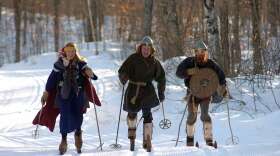A common complaint among school kids who don't want to learn their math is that it's not important in the real world. While there is a lot of theory in math, a growing body of researchers are proving this notion wrong by applying math in some surprisingly relevant ways.
Take for example Dr. Carlos Castillo-Chavez , a leading mathematical biologist. His work involves using math to predict the spread of diseases like influenza and HIV.
Castillo-Chavez, who has degrees from UWM, UW-Madison, and UW-Stevens Point, and is now a professor at Arizona State University, is also at the forefront of efforts to diversify the pool of students going into math and science fields. He recently gave the annual Marden Lecture in Mathematics at UWM.
He hopes that students will be inspired to pursue mathematics because of his groundbreaking work - and his unusual journey into the field.
Just $400
Castillo-Chavez once worked at a cheese factory in Merrill, Wis., but he soon found himself disenchanted with the cheese business and was determined to go to college. He gained admittance to UW-Stevens Point, and years later, he found he needed just $400 to complete his studies. But Financial Aid kept rejecting his requests.
In a math version of the Cinderella story, Castillo-Chavez happened to bump into the school's Chancellor, Lee Dreyfus, who would later become governor of Wisconsin. Dreyfus was impressed by Castillo-Chavez, though appalled when he learned of the student's situation. A call from the chancellor to Financial Aid secured the funding Castillo-Chavez needed and helped him get to where he is today.
Access to education
Castillo-Chavez's story explains why he is so passionate about educational access for all students. Castillo-Chavez says a lot of progress has been made for minorities and women students, but there are still hurdles for them. Castillo-Chavez, who immigrated to America from Mexico, has firsthand experience and wants those hurdles to be torn down.
He taught at Cornell University for 18 years, but now teaches at Arizona State University. He tries to give the same level of educational quality at Arizona State that he did while at Cornell.
“[Ivy league universities] educate a very small percentage/group of the population,” Castillo-Chavez says. “The majority of Americans do not go to these institutions and they need to have access to these institutions where the kinds of intellectual opportunities and challenges are identical.”
In addition to providing quality education, Castillo-Chavez says universities should also provide students the opportunity to be involved in state of the art research that will make an impact on society.
“The faculty of these institutions should be engaged also in research that improves the states, improves the country, and has much more impact than some others that other institutions should engage in,” says Castillo-Chavez.
Math and disease
In his research, Castillo-Chavez has found a mathematical correlation that explains how diseases spread. He says math could actually be used to decrease the numbers of those sickened by spreading disease.
“You use mathematics to try to extrapolate to a high level of complexity,” Castillo-Chavez says. “If we understand this interaction between individuals, how would these relate at the level of the city, state, or country?”
Interdisciplinary research is key to this study. By working at the university level, he is able to collaborate with other departments to bring together many different perspectives and a variety of expertise.
That's why Castillo-Chavez says more minds must have access to university-level education. One day, they might contribute to such out-of-the-box research.





